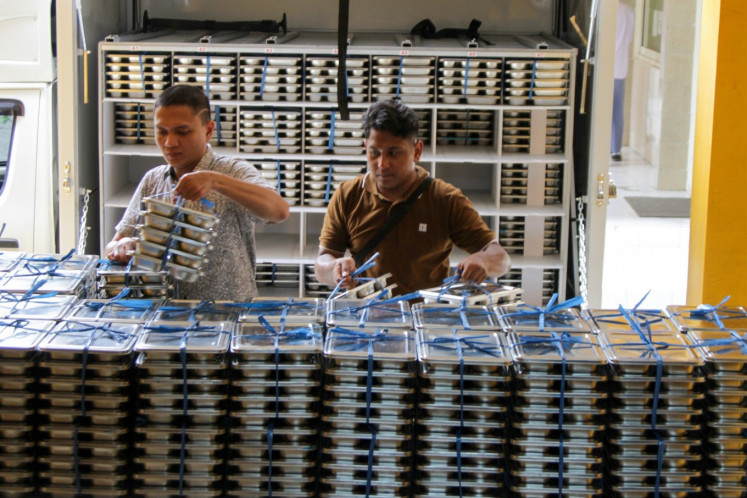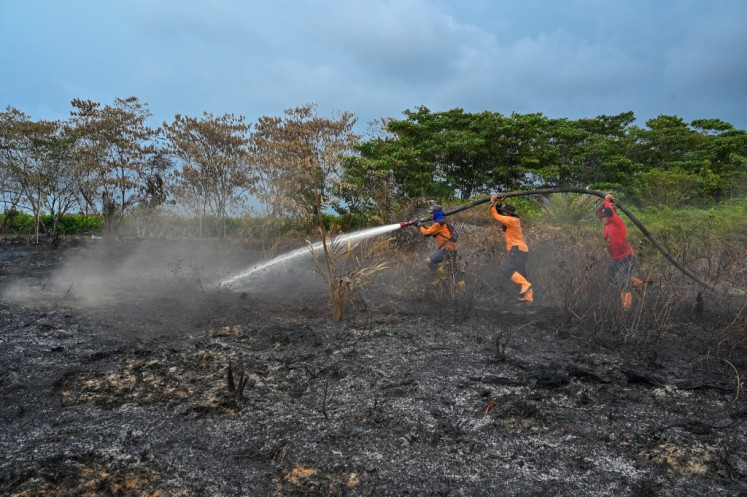Life is more unequal than you think
Which matters more: actual levels of inequality, or the levels that people perceive to exist? There is now clear evidence that perceptions of inequality have a profound impact on societies all over the world — and that people aren’t very good at judging the reality for themselves
Change text size
Gift Premium Articles
to Anyone

W
hich matters more: actual levels of inequality, or the levels that people perceive to exist? There is now clear evidence that perceptions of inequality have a profound impact on societies all over the world — and that people aren’t very good at judging the reality for themselves.
The trouble is, almost all research on inequality focuses on actual levels, which means our understanding of how people respond to inequality has been based on the assumption that people’s perceptions align with reality. And this, according to a unique survey of Indonesian people by the World Bank, is just not true.
The lack of credibility of this assumption suggests a range of research on inequality needs to be revisited, including Thomas Piketty’s famous theory that the actual level of social mobility in a country is related to people’s support for redistribution; the Indonesia results imply it should in fact be the perceived level of social mobility.
The World Bank’s nationally representative survey of more than 3,000 Indonesian households came about in 2014 because a range of stakeholders wanted to understand how Indonesians perceived their country’s deepening levels of inequality. There is literately no other survey like it for any country in the world, as it captures both people’s perceptions of inequality and their levels of support for redistribution to make Indonesia a more equal society.
As such, it provides the best insight currently available as to whether misperceptions of inequality reduce a society’s support for redistribution. And this is significant for people wherever they live, in this “post-truth” era of Trump, Brexit and fake news, where misperceptions are seen to play a strong role in the way people vote.
The reality of inequality in Indonesia is eye-watering: according to Oxfam’s latest report, four men are estimated to be worth the same amount as the poorest 100 million people, and the richest 1 percent now owns half the country’s wealth.
Yet the World Bank survey reveals that Indonesians dramatically underestimate the extent of inequality in their country. Nine in every 10 adults here believe they are located around the middle of the country’s income distribution — which means rich and poor alike tend to think they experience the “average” standard of living.
They also typically believe people can do more to improve their standard of living than is actually the case; that is, they overestimate the level of social mobility in Indonesian society.
Politically, these three widespread misperceptions about Indonesian inequality are significant. Collectively, they appear to be limiting public support for redistribution through policies such as increasing social protection.
People’s estimates of the overall distribution of income in Indonesia were elicited using a state-of-the-art approach developed by Harvard professor Michael Norton and co-authors in their studies on perceptions of inequality in the United States.
On average, Indonesians believed the country’s Gini coefficient of income inequality to be around 0.3, which is more equal than most countries in the world. In reality, Indonesia is about as unequal as the US, with a Gini coefficient of around 0.4 — higher than most countries.
Furthermore, when asked what they would prefer inequality to be, respondents’ answers implied an average “ideal Gini coefficient” of 0.15 — lower than any country has ever achieved.
Not surprisingly, the Indonesian survey found that people’s “inequality preferences” were closely linked to the policy priorities they wanted the country’s president to focus on. A preference for lower levels of inequality was associated with support for increasing social protection, while a preference for higher levels of inequality was related to supporting job creation as the number one policy priority.
Thus policymakers — not just in Indonesia — who are trying to address inequality should be aware that people may be less supportive of redistributive policies because they are unaware of just how unequal their society is.
The first step in trying to reduce inequality would appear to be communicating to the public just how unequal their society is and then what can be done to address it. Otherwise policymakers risk having limited public support for redistributive policies as people may believe they are trying to fix a smaller problem than actually exists.
Respondents to the Indonesian survey were roughly equally spread across the distribution – but they often did not perceive this to be the case. Indeed, almost 90 percent of respondents perceived they were located in the middle 60 percent of the income distribution — between the 20th and 80th percentile.
Remarkably, there was only a weak correlation between people’s actual place in the income distribution, and where they perceived themselves to be. In other words, on average, poor people overestimated and rich people underestimated their place in the distribution.
In fact, only one respondent out of 3,000 households thought they were located within the richest 20 perception of the distribution, even though around 600 respondents actually were.
Again, levels of support for different policies to address inequality varied significantly, depending on where people perceived themselves to be in the distribution. However, levels of support for the most popular policy priorities — social protection and job creation — did not differ much across the actual distribution. It’s only people’s perceptions of where they stand relative to others in society that really affect their support for different policies.
A further conclusion is that people’s own belief about whether they would benefit from a policy appears to be more important than ideology. This would imply that public support is likely to be higher for programs which
benefit everyone, such as universal healthcare provision, compared to those that target beneficiaries, such as tax credits for a select group.
The survey captures two main aspects of how people see social mobility: perception of their own experience and beliefs about whether people are rich or poor due to factors within their control.
Around two thirds of the people surveyed thought they would move up the income distribution from their current place by at least 20 percentage points within five years. So while people tend to perceive they are around the middle of the income distribution today, most people believe they will be well above average in the future.
Perceiving that one has experienced upward mobility in the past is associated with lower support for redistribution. In other words, it appears many people who believe they have moved up the distribution think that others can do the same — and are therefore less inclined to believe government intervention is required.
Almost half of respondents thought people were poor due to “internal” reasons such as being lazy, and believed that rich people gained their wealth through hard work. Perceiving that effort is the key determinant of a person’s standard of living was related to support for job creation as the best policy to reduce inequality. This overly optimistic belief in the causal link between effort and standard of living erodes support for redistribution.
The findings of the World Bank’s pioneering survey of Indonesian (mis)perceptions of inequality provide a first step in better understanding how support for wealth and income redistribution in a society is likely to be subdued by misperceptions of inequality.
______________________
The writer is a lecturer at the University of Sydney.









